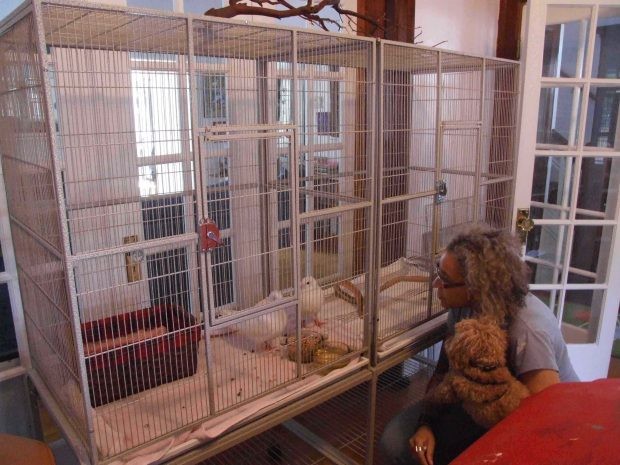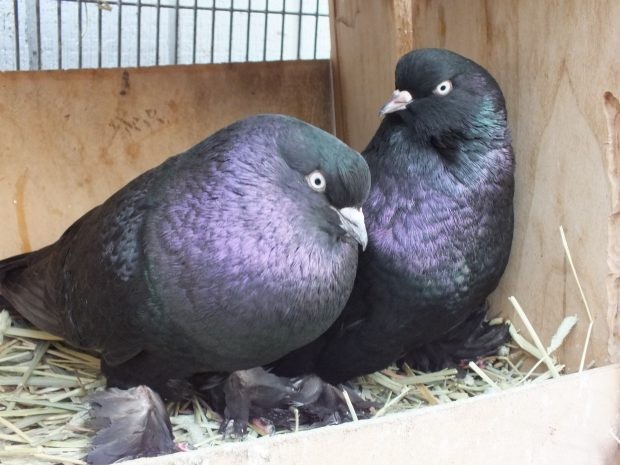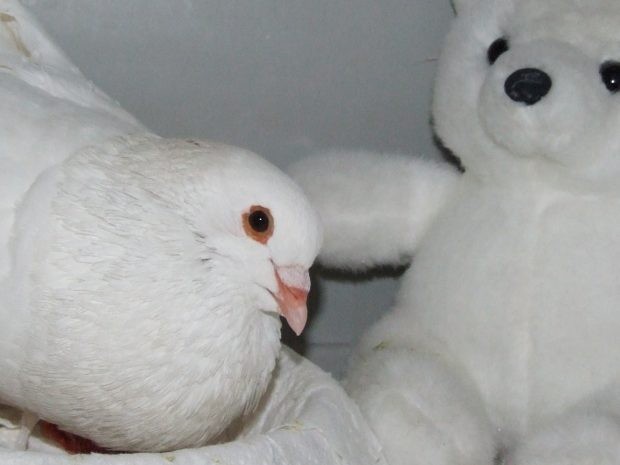Can You Have A Pigeon As A Pet? Absolutely! Pigeons, often misunderstood, make wonderful companions and are increasingly gaining recognition as intelligent and affectionate pets, as highlighted by PETS.EDU.VN. Understanding their needs and how to care for them ensures a happy and healthy life for your feathered friend, so it’s important to consider aspects like pigeon care, pigeon breeds, and aviary setup.
1. Understanding the Appeal of Pigeons as Pets
Pigeons are often overlooked as potential pets, but they possess several qualities that make them excellent companions. Their gentle nature, intelligence, and relatively low-maintenance care make them suitable for a variety of lifestyles.
1.1. Gentle and Docile Temperament
Pigeons are known for their calm and peaceful demeanor. They are not aggressive birds and generally enjoy human interaction. This makes them ideal pets for families with children or individuals seeking a tranquil companion.
1.2. Intelligence and Trainability
Pigeons are surprisingly intelligent creatures. They can be trained to perform simple tasks and tricks, and they quickly learn routines. This intelligence also makes them highly adaptable to different environments.
1.3. Low-Maintenance Care
Compared to many other pets, pigeons require relatively simple care. They don’t need to be walked, and their dietary needs are straightforward. With a clean environment and proper nutrition, pigeons can thrive with minimal effort.
1.4. Emotional Support
Pigeons are very emotional creatures. They can form strong bonds with their owners and offer emotional support. Their gentle cooing and presence can be comforting and therapeutic.
2. Legal and Ethical Considerations of Keeping Pigeons
Before bringing a pigeon home, it’s essential to consider the legal and ethical aspects of keeping them as pets. Understanding local regulations and ensuring the bird’s welfare are crucial.
2.1. Local Laws and Regulations
Check local ordinances and regulations regarding keeping pigeons as pets. Some areas have restrictions on the number of birds allowed or specific requirements for housing. For example, some cities may have ordinances related to bird keeping that aim to prevent nuisance or health issues.
2.2. Ethical Sourcing of Pigeons
Adopt, don’t shop. Instead of purchasing from breeders, consider adopting a pigeon from a rescue organization or animal shelter. Many domestic pigeons need homes because they cannot survive in the wild. Organizations like Palomacy Pigeon & Dove Adoptions specialize in rescuing and rehoming pigeons.
2.3. Conservation Status
Be mindful of the conservation status of different pigeon species. Avoid keeping wild or endangered species as pets, as this can contribute to their decline. Stick to domestic breeds that are bred for companionship.
2.4. Ensuring Welfare
Provide appropriate care, including a suitable living environment, proper nutrition, and regular veterinary check-ups. Commit to the pigeon’s well-being for its entire lifespan, which can be up to 15 years or more.
3. Choosing the Right Pigeon Breed for You
Different pigeon breeds have unique characteristics, so it’s essential to select one that suits your lifestyle and preferences. Some breeds are better suited for indoor living, while others thrive in outdoor aviaries.
3.1. Common Pigeon Breeds
-
King Pigeons: Large and gentle, King Pigeons are known for their docile nature and make excellent indoor pets. They are typically white and bred for meat production but are often rescued from agricultural settings.
-
Fantail Pigeons: These pigeons are known for their distinctive fan-shaped tails and ornamental appearance. They are friendly and adaptable, making them suitable for both indoor and outdoor environments.
-
Homer Pigeons: Bred for their homing ability, Homer Pigeons are intelligent and active. They require plenty of space to fly and exercise, so they are better suited for outdoor aviaries.
-
Tumbler Pigeons: Tumbler Pigeons are known for their acrobatic flying style. They are energetic and playful, making them entertaining pets for experienced bird keepers.
-
Frillback Pigeons: With their unique curled feathers, Frillback Pigeons are striking and ornamental. They are relatively low-maintenance and can thrive in indoor or outdoor settings.
| Breed | Size | Temperament | Housing | Special Needs |
|---|---|---|---|---|
| King Pigeon | Large | Gentle, Docile | Indoor/Outdoor | Prone to obesity, requires a balanced diet |
| Fantail Pigeon | Medium | Friendly, Adaptable | Indoor/Outdoor | Needs regular grooming to maintain tail feathers |
| Homer Pigeon | Medium | Intelligent, Active | Outdoor | Requires ample space for flying and exercise |
| Tumbler Pigeon | Small | Energetic, Playful | Outdoor | Benefits from training and mental stimulation |
| Frillback Pigeon | Medium | Calm, Low-Maintenance | Indoor/Outdoor | Requires gentle handling due to delicate feathers |




3.2. Matching Breed to Lifestyle
Consider your living situation, time commitment, and experience level when choosing a pigeon breed. If you live in an apartment, a King Pigeon might be a better choice than a Homer Pigeon, which needs more space. If you’re a first-time bird owner, a Fantail Pigeon’s adaptable nature could make it easier to care for.
4. Setting Up the Ideal Habitat for Your Pigeon
Whether you plan to keep your pigeon indoors or outdoors, creating a safe and comfortable habitat is essential for its well-being. The right environment will help your pigeon thrive and minimize potential health issues.
4.1. Indoor Housing
-
Cage Size: A double-flight cage or an extra-large dog kennel is a good size for a pair of pigeons. The cage should be large enough for the birds to move around comfortably and stretch their wings.
-
Cage Placement: Place the cage in a well-lit area away from drafts and direct sunlight. Pigeons enjoy being part of the family, so a location in a common area is ideal.
-
Cage Furnishings: Provide perches of varying sizes and textures to keep your pigeon’s feet healthy. Include food and water dishes, a bathing dish, and toys for enrichment.
-
Hygiene: Clean the cage daily to remove droppings and spilled food. Change the bedding regularly to prevent the buildup of bacteria and odors.
4.2. Outdoor Aviaries
-
Size: The minimum size for an aviary housing four pigeons should be at least 6 feet long by 4 feet deep and 6 feet high. Larger aviaries are always better, as they provide more space for the birds to fly and exercise.
-
Construction: The aviary must be predator-proof and rodent-proof. Use sturdy materials such as 16-gauge hardware mesh with openings of half an inch or smaller. Ensure the aviary is securely built all the way around, including the top and bottom.
-
Shelter: Include a sheltered corner that stays shady on the hottest days and dry during the rainiest weather. This will provide the birds with a place to escape the elements.
-
Enrichment: Add branches, perches, and nesting boxes to the aviary to provide the pigeons with opportunities for climbing, roosting, and nesting.
4.3. Temperature and Lighting Requirements
Pigeons are hardy birds and can tolerate a wide range of temperatures. However, they should be protected from extreme heat and cold. In indoor environments, maintain a consistent temperature between 60°F and 80°F. Outdoor aviaries should provide shade in the summer and protection from wind and rain in the winter.
Pigeons need natural light to maintain their health and well-being. If your pigeon is housed indoors, provide access to natural sunlight or use full-spectrum lighting to simulate the sun’s rays.
5. Providing a Balanced Diet for Your Pigeon
Proper nutrition is essential for maintaining your pigeon’s health and vitality. A balanced diet consisting of high-quality seeds, grains, and supplements will help your pigeon thrive.
5.1. Essential Nutrients
Pigeons need a diet that is rich in carbohydrates, proteins, fats, vitamins, and minerals. A good quality pigeon feed mix should contain a variety of seeds and grains, such as:
- Corn: Provides carbohydrates for energy.
- Wheat: Another source of carbohydrates and fiber.
- Peas: Rich in protein and essential amino acids.
- Sorghum: A good source of energy and nutrients.
- Safflower Seeds: High in fat and protein.
- Sunflower Seeds: Another source of fat and protein.
5.2. Feeding Schedule and Portion Sizes
Feed your pigeon twice a day, providing a measured amount of food that they can consume in about 15-20 minutes. Avoid overfeeding, as this can lead to obesity and other health problems. The amount of food will vary depending on the size and activity level of your pigeon, but a general guideline is to provide about 1-1.5 ounces of feed per bird per day.
5.3. Supplements and Treats
In addition to their regular feed, pigeons can benefit from supplements and treats. Grit is essential for helping pigeons digest their food, as they don’t have teeth. Provide a small dish of grit at all times. You can also offer treats such as fresh fruits, vegetables, and greens in moderation.
5.4. Water Requirements
Fresh, clean water should be available to your pigeon at all times. Change the water daily and clean the water dish regularly to prevent the growth of bacteria.
6. Grooming and Hygiene Practices for Pigeons
Maintaining good hygiene is crucial for keeping your pigeon healthy and happy. Regular grooming and cleaning will help prevent diseases and parasites.
6.1. Bathing
Pigeons enjoy bathing and should be provided with a shallow dish of water for bathing at least once a week. Bathing helps keep their feathers clean and healthy and prevents the buildup of dust and dirt.
6.2. Nail Trimming
Pigeon nails can grow long and sharp, so it’s important to trim them regularly. Use a pair of bird nail clippers to trim the nails, being careful not to cut into the quick. If you’re unsure how to trim your pigeon’s nails, consult a veterinarian or experienced bird keeper.
6.3. Feather Care
Pigeons preen their feathers regularly to keep them clean and in good condition. However, you can help them out by gently misting their feathers with water occasionally. This will help remove dust and debris and keep their feathers looking their best.
6.4. Cage and Aviary Cleaning
Clean your pigeon’s cage or aviary daily to remove droppings and spilled food. This will help prevent the buildup of bacteria and odors. Once a week, thoroughly clean the cage or aviary with a mild disinfectant.
7. Health Concerns and Veterinary Care for Pigeons
Like all pets, pigeons are susceptible to certain health problems. Regular veterinary check-ups and prompt treatment of any health issues are essential for keeping your pigeon healthy.
7.1. Common Pigeon Diseases
-
Canker: A parasitic disease that affects the throat and digestive system. Symptoms include difficulty swallowing, weight loss, and lesions in the mouth.
-
Pigeon Pox: A viral disease that causes wart-like lesions on the skin and mucous membranes.
-
Paratyphoid: A bacterial infection that can cause diarrhea, vomiting, and paralysis.
-
Respiratory Infections: Pigeons are susceptible to various respiratory infections, including mycoplasmosis and chlamydia.
-
Parasites: Pigeons can be infested with internal and external parasites, such as worms, mites, and lice.
7.2. Recognizing Signs of Illness
Be observant of your pigeon’s behavior and appearance. Common signs of illness include:
- Loss of appetite
- Weight loss
- Lethargy
- Fluffed feathers
- Diarrhea
- Vomiting
- Difficulty breathing
- Discharge from the eyes or nostrils
7.3. Finding a Qualified Veterinarian
Not all veterinarians are experienced in treating birds. It’s important to find a veterinarian who has experience with pigeons and other avian species. Ask your local bird club or rescue organization for recommendations.
7.4. Vaccination and Preventative Care
Vaccinations are available for some pigeon diseases, such as pigeon pox. Talk to your veterinarian about whether vaccination is appropriate for your pigeon. Regular deworming and treatment for external parasites are also important preventative measures.
8. Potty Training and Managing Pigeon Droppings
One of the biggest concerns for people considering keeping pigeons as indoor pets is managing their droppings. However, with a little training and the right tools, it’s possible to keep your home clean and hygienic.
8.1. The Concept of Potty Training Pigeons
Believe it or not, pigeons can be potty trained! The key is consistency and positive reinforcement.
8.2. Step-by-Step Potty Training Guide
- Choose a Spot: Select a specific area in the cage or a designated spot outside the cage where you want your pigeon to relieve themselves.
- Observation: Watch your pigeon closely and learn their pre-elimination cues (e.g., circling, squatting).
- Placement: When you see your pigeon exhibiting these cues, gently place them on the designated spot.
- Reward: If they eliminate in the correct spot, immediately reward them with a treat and praise.
- Consistency: Repeat this process consistently, and your pigeon will eventually associate the designated spot with elimination.
8.3. Pigeon Pants: A Practical Solution
For indoor pigeons, pigeon pants are a game-changer. These adorable little harnesses with a diaper to catch droppings make it possible for your pigeon to roam freely around the house without making a mess.
8.4. How to Use Pigeon Pants
- Introduction: Introduce the pants gradually, allowing your pigeon to get used to wearing them for short periods.
- Comfort: Make sure the pants fit comfortably and don’t restrict your pigeon’s movement.
- Diaper Changes: The diaper, lined with half a panty-liner, should be changed every 3 hours.
9. Socialization and Enrichment for Pigeons
Pigeons are social creatures and need companionship and mental stimulation to thrive. Providing opportunities for socialization and enrichment will keep your pigeon happy and prevent boredom.
9.1. The Importance of Companionship
Pigeons are very social creatures and do need a BFF, whether another bird or a human with whom they can spend the day. (Home all alone in a cage isn’t a good life for a pigeon.)
9.2. Introducing Pigeons to Other Pets
Pigeons can live peacefully with other pets, such as dogs and cats, as long as they are kept safe. Supervise interactions between pigeons and other pets, especially during the initial introduction period.
9.3. Toys and Activities for Mental Stimulation
Provide your pigeon with toys and activities to keep them mentally stimulated. Pigeons enjoy playing with:
- Mirrors: Pigeons love to look at themselves in mirrors.
- Balls: Small, lightweight balls can be fun for pigeons to chase and peck at.
- Swinging Perches: These provide a fun and challenging perch for pigeons to exercise their balance.
- Foraging Toys: These toys require pigeons to work for their food, which can help prevent boredom.
9.4. Training and Interaction
Pigeons are intelligent birds and can be trained to perform simple tasks and tricks. Training sessions provide mental stimulation and strengthen the bond between you and your pigeon. Spend time interacting with your pigeon daily, talking to them, petting them, and playing with them.
10. Addressing Common Misconceptions About Pigeons
Pigeons are often misunderstood and unfairly maligned. Addressing common misconceptions about these birds can help people appreciate their true nature and potential as pets.
10.1. Pigeons as “Flying Rats”
One of the most common misconceptions about pigeons is that they are dirty and disease-ridden. In reality, pigeons are no dirtier than other birds, and they are not a significant source of disease.
10.2. Pigeons as Pests
While feral pigeons can be a nuisance in urban areas, domestic pigeons are gentle and well-behaved pets. With proper care and training, they can be a joy to have around.
10.3. The Intelligence of Pigeons
Pigeons are often underestimated in terms of intelligence. However, studies have shown that they are capable of complex cognitive tasks, such as recognizing human faces and distinguishing between different objects. According to a study by Watanabe et al. (1995) in the Journal of Experimental Analysis of Behavior, pigeons can even learn to discriminate between paintings by Monet and Picasso.
10.4. Pigeons as Affectionate Companions
Contrary to popular belief, pigeons can be very affectionate and bond closely with their owners. They enjoy being petted and cuddled and will often seek out human interaction.
11. Finding Pigeons for Adoption
If you’re ready to bring a pigeon into your life, adoption is the best option. Many domestic pigeons need homes because they cannot survive in the wild.
11.1. Pigeon Rescue Organizations
Organizations such as Palomacy Pigeon & Dove Adoptions specialize in rescuing and rehoming pigeons. They can help you find the perfect pigeon for your family and provide guidance on caring for your new pet.
11.2. Animal Shelters
Check your local animal shelters for pigeons that are available for adoption. Many shelters take in pigeons that have been found as strays or surrendered by their owners.
11.3. Online Adoption Listings
Websites such as Petfinder and Adopt-a-Pet list pigeons that are available for adoption in your area.
12. Success Stories: Real-Life Experiences of Pigeon Owners
Hearing from other pigeon owners can provide inspiration and valuable insights into the joys and challenges of keeping these birds as pets.
12.1. Testimonials from Pigeon Owners
“I never thought I would have a pigeon as a pet, but after adopting one from a rescue organization, I can’t imagine my life without him. He’s such a sweet and gentle bird, and he brings so much joy to my life.” – Sarah, pigeon owner.
“My pigeon, Pip, is the best pet I’ve ever had. He’s so smart and affectionate, and he loves to cuddle. I take him everywhere with me, and he’s always a hit with people I meet.” – John, pigeon owner.
12.2. Overcoming Challenges
Some pigeon owners have faced challenges such as dealing with health problems or managing droppings. However, with perseverance and the right resources, these challenges can be overcome.
13. Resources for Pigeon Owners
Whether you’re a first-time pigeon owner or an experienced bird keeper, there are many resources available to help you care for your pet.
13.1. Websites and Online Forums
Websites such as PETS.EDU.VN, Palomacy Pigeon & Dove Adoptions, and Pigeon Talk provide valuable information on pigeon care, health, and behavior. Online forums are also a great place to connect with other pigeon owners and ask questions.
13.2. Books and Guides
Several books and guides are available on pigeon care, including “The Pigeon: A Pet Owner’s Guide” by Pam Tennyson and “Pigeons for Dummies” by Pam Tennyson.
13.3. Local Bird Clubs
Joining a local bird club can provide opportunities to learn from experienced bird keepers, attend educational events, and participate in pigeon shows.
14. The Unique Bond Between Humans and Pigeons
Pigeons have a long and fascinating history with humans, dating back thousands of years. From their use as messengers in ancient times to their role as beloved pets today, pigeons have always held a special place in our hearts.
14.1. Historical Significance
Pigeons have been used for various purposes throughout history, including:
- Messengers: Pigeons were used to carry messages over long distances, especially during times of war.
- Racing: Pigeon racing has been a popular sport for centuries.
- Food Source: Pigeons were once a common source of food for humans.
14.2. The Future of Pigeons as Pets
As more people discover the joys of keeping pigeons as pets, their popularity is likely to grow. With proper care and understanding, pigeons can be wonderful companions for many years to come.
15. Dispelling Myths and Embracing the Reality of Pigeon Ownership
Owning a pigeon is not just about having a pet; it’s about embracing a unique and rewarding relationship with an intelligent and affectionate creature.
15.1. The Joy of Pigeon Ownership
Pigeons bring joy and companionship to the lives of their owners. Their gentle cooing, playful antics, and affectionate nature make them a delight to have around.
15.2. The Importance of Responsible Ownership
As with any pet, responsible ownership is essential for ensuring the well-being of your pigeon. This includes providing proper care, seeking veterinary attention when needed, and educating others about the joys of pigeon ownership.
Can you have a pigeon as a pet? Absolutely, and with the right care and understanding, you can provide a loving home for these remarkable birds.
Ready to learn more about pigeon care? Visit PETS.EDU.VN for in-depth guides, expert advice, and a supportive community of pet lovers. We’re here to help you every step of the way, from choosing the right breed to providing the best possible care for your feathered friend.
Contact us:
- Address: 789 Paw Lane, Petville, CA 91234, United States
- WhatsApp: +1 555-987-6543
- Website: pets.edu.vn
FAQ: Common Questions About Keeping Pigeons as Pets
1. Are pigeons good pets for beginners?
Yes, pigeons can be good pets for beginners due to their relatively low-maintenance care and gentle nature. However, it’s important to do thorough research and understand their specific needs before bringing one home.
2. Do pigeons require a lot of space?
Pigeons require adequate space, whether indoors or outdoors. Indoor pigeons need a large cage, while outdoor pigeons thrive in spacious aviaries. The more space you can provide, the better.
3. How long do pigeons live as pets?
Pigeons can live for 15 years or more with proper care and a healthy diet.
4. What do pigeons eat?
Pigeons eat a variety of seeds, grains, and supplements. A good quality pigeon feed mix should contain corn, wheat, peas, sorghum, and safflower seeds.
5. Are pigeons noisy pets?
Pigeons are not excessively noisy pets. They coo softly, which most owners find soothing rather than disruptive.
6. Do pigeons need to be vaccinated?
Vaccinations are available for some pigeon diseases, such as pigeon pox. Consult with a veterinarian to determine whether vaccination is appropriate for your pigeon.
7. Can pigeons be potty trained?
Yes, pigeons can be potty trained to eliminate in a designated spot. Consistency and positive reinforcement are key to success.
8. Are pigeons affectionate pets?
Yes, pigeons can be very affectionate and bond closely with their owners. They enjoy being petted and cuddled and will often seek out human interaction.
9. Do pigeons get along with other pets?
Pigeons can live peacefully with other pets, such as dogs and cats, as long as they are kept safe and interactions are supervised.
10. Where can I adopt a pigeon?
You can adopt a pigeon from pigeon rescue organizations, animal shelters, and online adoption listings.
Janelle and Beep engage Petey and Pineapple in conversation within their spacious double-flight cage, highlighting the importance of adequate space for pet pigeons.
King Pigeon Yuzu, comfortably wearing pigeon pants, poses with his adopter Shae, showcasing a practical solution for managing indoor pet pigeon hygiene.
West of England Tumblers Beau and Cher, devoted mates, illustrate the affectionate and social nature of pigeons, emphasizing the importance of companionship for these birds.
Adopter Helen and her flock of six pigeons thrive in their aviary, demonstrating the joy and fulfillment of providing a safe and enriching environment for pet pigeons.
Frances playfully flirts with his teddy bear, underscoring the unique bond and affectionate nature that can develop between humans and pet pigeons.

